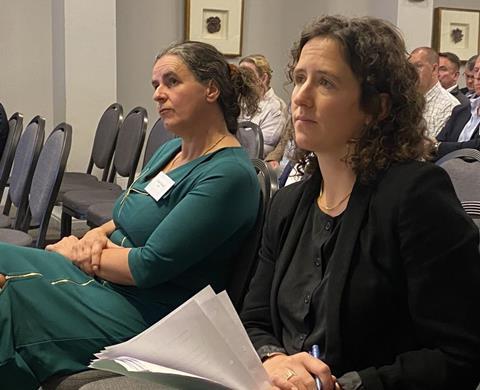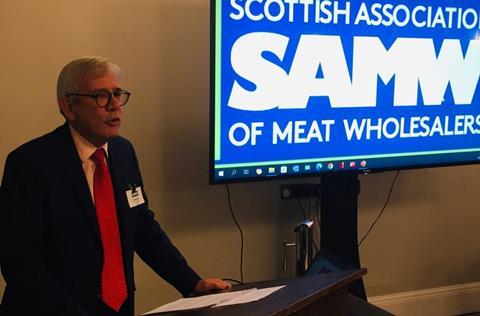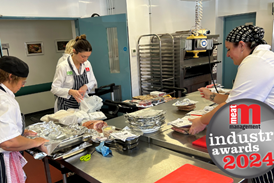President of the Scottish Association of Meat Wholesalers (SAMW) Ian Bentley told the trade body's annual conference that a lack of policy which supports and promotes Scotland as a key, sustainable producer of quality meat on the domestic and world stage is harming industry confidence.

SAMW hosted its annual conference on 1st September in Edinburgh, where president Ian Bentley delivered an opening speech to guests.
Addressing the conference, Bentley said: "A year ago, we were cautiously celebrating the relaunch of our Conference after the years of the pandemic, while at the same time feeling the uncertainty of a world changed by an outbreak of war and strong economic head winds. Some of those uncertainties turned into reality and we are still dealing with them, but the impact of others, for example energy costs, have alleviated slightly."
The conference aimed to help illustrate what the future may look like and what the Scottish meat industry needs to do to ensure it materialises. Bentley added: "As always, there is much for us to do, but my main message is that Scotland’s meat industry needs help.
"We need help to reverse the long-term decline in livestock production in Scotland, a decline which, if it continues, will ultimately call into question the viability of our industry."
Bentley continued: "We know that at times over the years producers have been critical of farmgate prices, and this was often cited as the reason behind falling numbers. But returns over the past couple of years have improved considerably, yet we have not seen the stimulus to production which we might expect.
"Instead, the slow downward trend is continuing. I believe this is because we are not seeing the development of a clear, unequivocal policy of support and promotion for Scotland as a key producer of quality meat on the domestic and world stage, a policy which is actively encouraging and incentivising quality livestock production using sustainable practices. The absence of this clear policy harms confidence and contributes to the decline in numbers."
SAMW urges Scotland to support sustainable production

Bentley welcomed the boldness of Quality Meat Scotland’s five-year strategy, but added that "it needs to be underpinned by Government policies which are aligned and designed to make that vision happen."
He said: "Scotland is one of the best places in the world to raise livestock for high quality meat in a sustainable way. We have water, we have grass, we have a temperate climate. We have very high standards of animal welfare and regulatory oversight.
"Despite the regular bashing which meat gets, consumers in many countries are proving to be very loyal to an omnivorous diet, and we know that as prosperity grows in emerging countries, their populations want to, and will, increase their consumption of meat products. Scotland should be gearing up to meet this increasing demand by introducing policies which support increased sustainable production.
"But we are not alone. Other nations have recognised these global trends and are responding to them with coordinated activities which are designed to demonstrate the positive attributes of their production. Scotland needs to be joining, and winning, that race."
Industry looks towards the future
Bentley stressed the importance of focusing on environmental impact: "There is much for us to do as an industry. Carbon is a good place to start – there are great examples in our industry of advances in moving towards net zero. I suspect, however, that we are not doing enough to raise awareness of our progress so that we are not an easy target for those who delight in campaigning against meat production because of emissions.
"Emissions are not a reason to abandon or even reduce production in Scotland. Instead, emissions should be the subject of funded research and rational investigation to find the best way of minimising them, while also recognising the positive sustainable credentials of extensive production on grass. The easy answer – to reduce livestock numbers in Scotland – will simply encourage production in other countries which could be much more harmful to the environment."
"I urge everyone... to make sure that as new policy details emerge, they are aimed clearly and unequivocally at enabling this industry to grow."
Ian Bentley, SAMW president.

"Human health is another area for our industry to get its act together, but with strong sustained support by policies. We are starting to see a more sober and balanced attitude to meat eating emerging from opinion formers but there is more to be done.
"This year’s big target seems to be ultra processed foods and their detrimental impact on our health. So, other than a raw carrot, I ask you – what could be a less processed food than a steak, a chop, or a roasting joint?
"Meat substitute product ingredients lists read like a chemistry set. The ingredients list for a piece of meat, in contrast, is relatively short to the tune of one. But I don’t hear the pundits recognising the simple fact that meat is a natural unprocessed food with lots of essential health-giving attributes.
"We need to do more to get these messages across. We are not helped, however, when official bodies start taking pot shots – please help us to ensure a rational and sober presentation of the facts."
He said: "We have an industry of which Scotland can be proud and is indeed recognised worldwide as a source of excellence. I was in a supermarket in France recently which was proudly promoting its beef as Aberdeen Angus – an industry which should be seen as an opportunity for Scotland to advertise itself as a high-quality food producer – but an industry where its raw material continues to reduce year after year.
"As Joni Mitchell said about Paradise and parking lots – 'You don’t know what you’ve got till it’s gone'. I urge everyone who cares about our industry, and even those who don’t, to see the opportunity and the threat, and to make sure that as new policy details emerge, they are aimed clearly and unequivocally at enabling this industry to grow."
This story was originally published on a previous version of the Meat Management website and so there may be some missing images and formatting issues.





